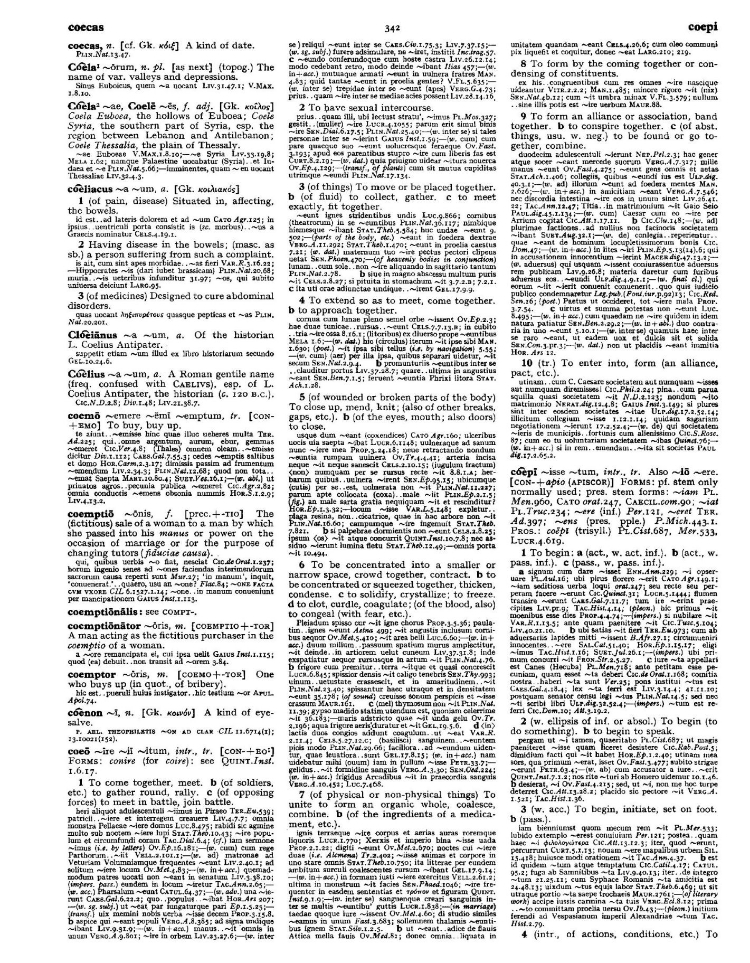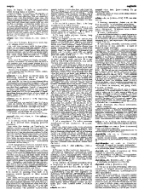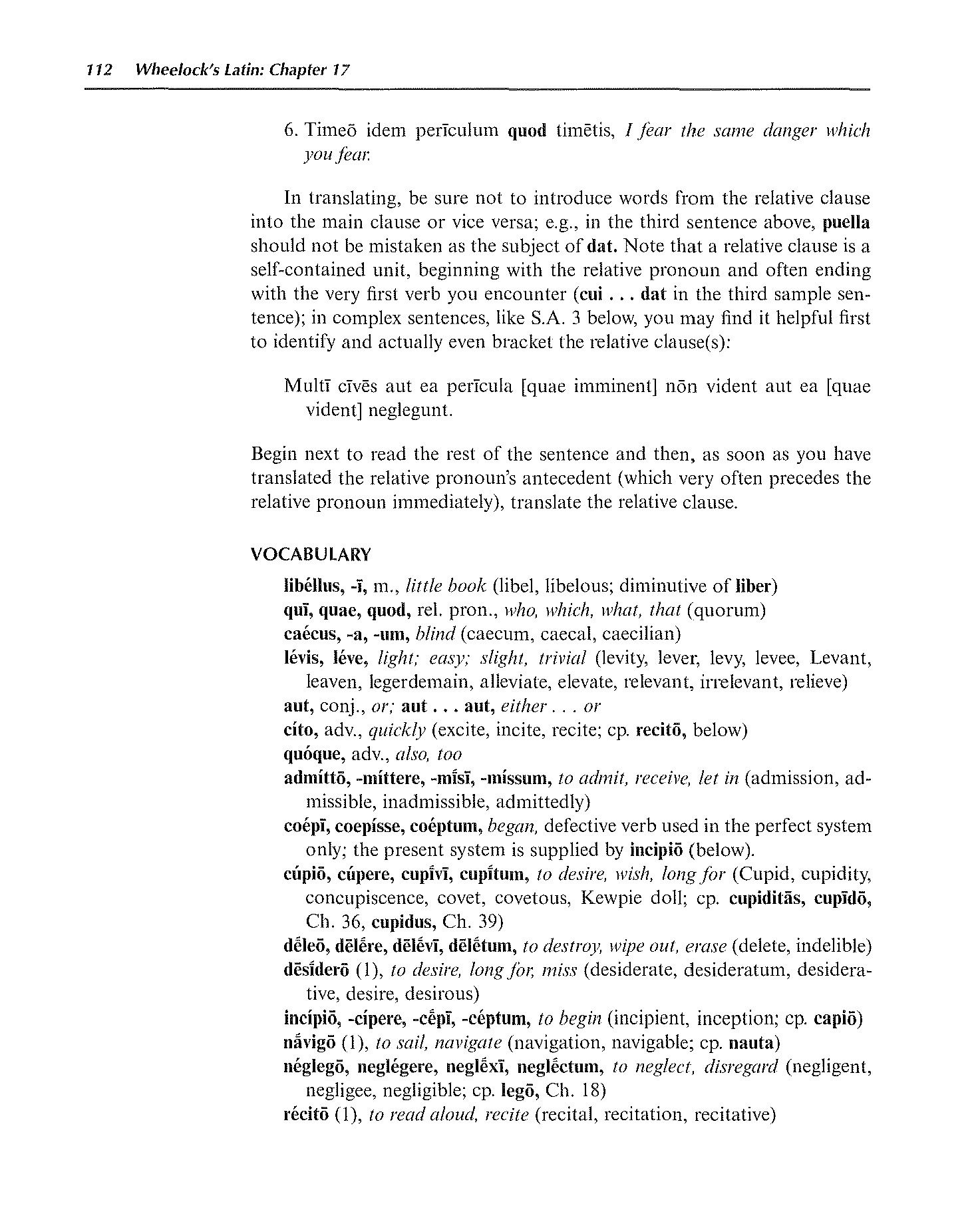
page_listing.tpl
page_subListingDetails.tpl
sub_listingDetails_style1.tpl
sub_listingDetails.title.tpl
coepisse to begin
coepisse is a Latin Verb that primarily means to begin.
Definitions for coepisse
Wheelock's Latin
Verb
- 1
began
- 2
defective verb used in the perfect system; the present system is supplied by incipiō
Oxford Latin Dictionary
Verb
- 1
To begin: (a) (act, w. act. inf.). (b) (act., w. pass, inf.). (c) (pass. inf.).
- 2
(w. ellipsis of inf. or absol.) To begin (to do something(. (b) to begin to speak.
- 3
(w. acc.) To begin, initiate, set on foot. (b) (pass.).
- 4
(intr., of actions, conditions, etc.) To begin, be begun. (b) (pple. w. quasi-active sense) having begun or started.
Sentences with coepisse
Latin to English
Diū oppressī, sē contrā opprimentem tyrannum vertere coepērunt.Compare Long oppressed, they began to turn themselves against the oppressing tyrant.
Hīs rēbus audītīs, coepit timēre.Compare When (since, after, etc., depending on the context) he had heard these things, he began to be afraid.
Dimidium facti qui coepit habet; sapere aude; incipe! Qui recte vivendi prorogat horam, rusticus exspectat dum defluat amnis; at ille labitur et labetur in omne volunilis aevum.Compare He who has begun his task has half done it. Have the courage to be wise. Begin! He who keeps putting off the moment of reform is like the countryman waiting for the river to run by. But the river slides and rolls, will slide and roll on to all time.
Hibernaculum, res novus miles Romanus, aedifico coepi.Compare Winter tents, a novelty to the Roman soldier, were begun to be built.
Quoniam rectus consilium haud bene evenio, pravus utor coepi.Compare Since just plans had not turned out well, he began to use base ones.
Inde plebs ab iuvenis Patres iniuria fio coepi.Compare Then injuries began to be inflicted on the people by the younger patricians.
Conjugation table for coepisse
Cactus2000
| ACTIVE | |
| Indicative present | Indicative imperfect |
| - - - - - - | - - - - - - |
| Indicative perfect | Indicative pluperfect |
| coepī coepistī coepit coepimus coepistis coepērunt / coepēre | coeperam coeperās coeperat coeperāmus coeperātis coeperant |
| Indicative future | Indicative future perfect |
| - - - - - - | coeperō coeperis coeperit coeperimus coeperitis coeperint |
| Subjunctive present | Subjunctive imperfect |
| - - - - - - | - - - - - - |
| Subjunctive perfect | Subjunctive pluperfect |
| coeperim coeperis coeperit coeperimus coeperitis coeperint | coepissem coepissēs coepisset coepissēmus coepissētis coepissent |
Infinitive present - Infinitive perfect coepisse Infinitive future coeptūrum esse | Imperative present - - Imperative future - - - - |
| PARTICIPLE | ||
| Participle present active | ||
| Participle future active | ||
| coepiminī | coepēbāmur | |
| coepiminī | coepēbāmur | |
| coepiminī | coepēbāmur | |
| coepiminī | coepēbāmur | |
| coepiminī | coepēbāmur | |
| Participle perfect passive | ||
| coepētur | coepāris / $āre | |
| coepētur | coepāris / $āre | |
| coepētur | coepāris / $āre | |
| coepētur | coepāris / $āre | |
| coepētur | coepāris / $āre | |
| Gerundive | ||
| coeperer | coeperentur | |
| coeperer | coeperentur | |
| coeperer | coeperentur | |
| coeperer | coeperentur | |
| coeperer | coeperentur | |
| Gerund | Supine | |
| coep- | ||
| coep- | ||
| coep- | ||
| coep- | ||
| coep- | ||
| PARTICIPLE | ||
| Participle present active | ||
| Nom. | - | - |
| Gen. | - | - |
| Dat. | - | - |
| Acc. | - | - |
| Abl. | - | - |
| Participle future active | ||
| Nom. | coeptūrus | coeptūrī |
| Gen. | coeptūrī | coeptūrōrum |
| Dat. | coeptūrō | coeptūrīs |
| Acc. | coeptūrum | coeptūrōs |
| Abl. | coeptūrō | coeptūrīs |
| Participle perfect passive | ||
| Nom. | coeptus | coeptī |
| Gen. | coeptī | coeptōrum |
| Dat. | coeptō | coeptīs |
| Acc. | coeptum | coeptōs |
| Abl. | coeptō | coeptīs |
| Gerundive | ||
| Nom. | - | - |
| Gen. | - | - |
| Dat. | - | - |
| Acc. | - | - |
| Abl. | - | - |
| Gerund | Supine | |
| Nom. | - | - |
| Gen. | - | - |
| Dat. | - | |
| Acc. | - | |
| Abl. | - | |
Data sources
Notes
- Definitions
- Frederick M. Wheelock, Wheelock's Latin, 6th ed., rev. Richard A. LaFleur (New York, NY: HarperCollins Publishers, 2005): 112.
- P. G. W. Glare, Oxford Latin Dictionary, Vols. 1-8 (Oxford: Clarendon Press, 1982): 342.
- Word frequencies
- Christopher Francese, "Latin Core Vocabulary," Dickinson College Commentaries, last modified 2014, http://dcc.dickinson.edu.
- Paul B. Diederich, The Frequency of Latin Words and Their Endings, PhD diss., (Columbia University, 1939).
- Louis Delatte, Suzanne Govaerts, Joseph Denooz, and Etienne Evrard, Dictionnaire fréquentiel et index inverse de la langue latine [Frequency Dictionary and Inverse Index of the Latin Language] (Liège, Belgium: Laboratoire d'analyse statistique des langues anciennes de l'Université de Liège [L.A.S.L.A.], 1981): 120.
Bibliography
Allen, Joseph H. Allen and Greenough's New Latin Grammar for Schools and Colleges: Founded on Comparative Grammar. Edited by James B. Greenough, George L. Kittredge, Albert A. Howard, and Benjamin L. D'Ooge. Boston, MA: Ginn & Company, 1903.
Crystal, David. A Dictionary of Linguistics and Phonetics. 6th ed. Oxford, UK: Blackwell Publishing, 2008.
Delatte, Louis, Suzanne Govaerts, Joseph Denooz, and Etienne Evrard. Dictionnaire fréquentiel et index inverse de la langue latine [Frequency Dictionary and Inverse Index of the Latin Language]. Liège, Belgium: Laboratoire d'analyse statistique des langues anciennes de l'Université de Liège (L.A.S.L.A.), 1981.
Diederich, Paul B. The Frequency of Latin Words and Their Endings. PhD diss., Columbia University, 1939.
Francese, Christopher. "Latin Core Vocabulary." Dickinson College Commentaries. Last modified 2014. http://dcc.dickinson.edu/latin-vocabulary-list.
Gildersleeve, Basil L., and Gonzales Lodge. Gildersleeve's Latin Grammar: Third Edition, Revised, and Enlarged. 3rd ed. London, England: Macmillan and Co., 1903.
Glare, Peter G.W. Oxford Latin Dictionary. Vols. 1-8. Oxford, England: Clarendon Press, 1982.
Krüger, Bernd. "Latin Conjugation Tables." Cactus2000. Accessed May 5, 2023. https://latin.cactus2000.de/index.en.php.
Pierson, Nick. "Sound of Text." Accessed October 26, 2019. https://soundoftext.com.
Wheelock, Frederick M. Wheelock's Latin. 6th ed. Revised by Richard A. LaFleur. New York, NY: HarperCollins Publishers, 2005.
Wiktionary Contributors. "Victionarium." Wikimedia Foundation, Inc. Updated March 18, 2019. https://la.wiktionary.org/wiki/Victionarium:Pagina_prima.
Citation
Chicago (17th ed.)
Allo Contributors. "coepī, coepisse, coeptum (v.) - Latin Word Definition." Allo Latin Dictionary. Last modified . Accessed January 30, 2026. http://ancientlanguages.org/latin/dictionary/coepi-coepisse-coepi-coeptum.
Entry created on . Last updated on .








